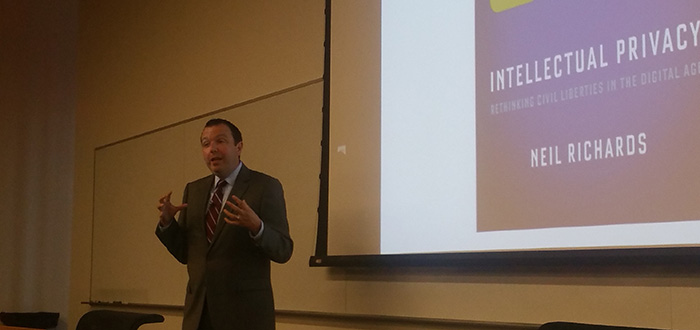Internationally renowned privacy law expert and author Neil Richards spoke at Fordham Law School on September 16 about his debut book Intellectual Privacy, why he believes surveillance makes us act “more normal,” and the need for laws protecting consumer information online.
“Intellectual privacy,” a phrase he first coined, is “for anyone with intellect, not just intellectuals,” the 42-year-old Washington University School of Law professor said during his wide-ranging talk. The phrase, he explained, means “protection from surveillance or interference when we are engaged in the processes of generating ideas.”
The book Intellectual Privacy reflects two key ideas: free speech usually wins when it conflicts with privacy and free speech requires intellectual privacy.
“The Internet of anonymity, openness, and expression became the Internet of surveillance, tracking, and monitoring,” Richards noted.
Surveillance makes us boring, bland, and mainstream, the St. Louis-based professor surmised. It does not make us better but rather more normal. Hence, people are less likely to google “socially stigmatized” phrases about hair loss or homosexuality, he said.
Google search histories tell us what we’re thinking, Richards explained. He likened this idea to a drawing his 7-year-old son made featuring all his thoughts. “They have something close to this (drawing) and probably more accurate,” Richards said of Google’s gateway into the human mind.
E-readers, by contrast, provide consumers the illusion of privacy. The 50 Shades of Grey phenomenon exploded, in part, because it provided people the chance to buy or read the raunchy book without judgment.
That didn’t mean Amazon didn’t know the readers’ secret, Richards said. There are few laws in place “for Amazon to prevent them from sharing the data.”
Just because consumers share their information with online corporations does not mean they should be free to do whatever they want with it, he contended.
“I’m not saying predictive engines are bad,” said Richards, listing personalized online radio station Pandora as an example of a predictive engine he enjoys. “But just like internal combustion engines they can be used in better and worse ways.”
Whereas protective measures don’t exist for book readers except in libraries, the Video Privacy Protection Act (1988) prevents distributors of video content to share your viewing information with outside parties. The law applied first to videotapes but today applies to Netflix, Hulu, and others.
Richards urged the audience to think beyond tort privacy and think about protecting “intellectual privacy” through the law.
“Our old ideas need to be built into our new technology,” Richards said, agreeing with British author Zadie Smith’s comments that the western world tends to expect new technology, and by extension new ideas, “will look after themselves.”
“I’d hate for us to trade (our values) for a faster search engine or a cool new gadget that doesn’t really improve our lives, except in a transient way,” he said.
The divergent debates in America and Europe about technology (i.e., surveillance in America; the right to be forgotten in Europe) highlight how privacy discussions are not set in stone.
“There’s nothing inevitable about technology,” he said, reasoning human decision-making ultimately governs technology’s direction.
Richards’ “Book Talk” appearance came after snowstorms in February and March postponed his scheduled speaking engagements. Fordham’s Center on Law and Information Policy and Data & Society co-sponsored the event.
–Ray Legendre

